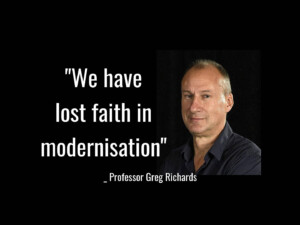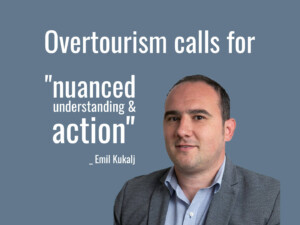Prof Soile Veijola on tourism studies, overtourism, the present, and the future
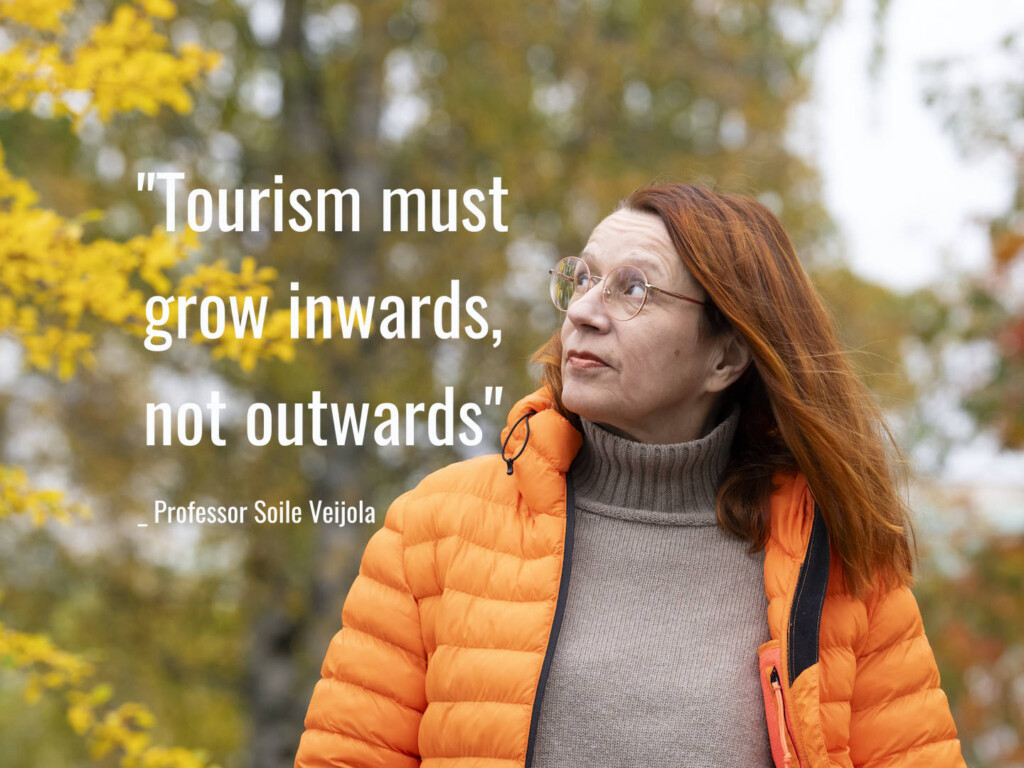
For all its diverse ontologies and epistemologies, tourism academia and research have not influenced industry practice as much as it could have, according to Soile Veijola. That puts her hopes of an ‘ethical turn’ in tourism at risk and has her worried about the future of the phenomenon.
Professor Veijola participated in a Tourism’s Horizon Interview. For this “Good Tourism” Insight, Vilhelmiina Vainikka summarises the highlights. [The full transcript is on Substack.]
Contents
- Who is Professor Soile Veijola?
- Tourism studies vs tourism realities
- On diverse and multidisciplinary approaches to tourism studies
- ‘Tourism planning has not evolved at all in 40 years’
- ‘Overtourism’ and dreaming of an ‘ethical turn’
- Mass tourism and contemporary culture
- The future of tourism
- What do you think?
- About the author
- About the Tourism’s Horizon Interviews
- Featured image (top of post)
Who is Professor Soile Veijola?
Soile Veijola, Professor of Cultural Studies of Tourism at the University of Lapland, is a renowned theorist of contemporary tourism cultures.
Many tourism researchers and students have been inspired by her article “The Body in Tourism” (1994) with Eeva Jokinen, which contributed to a paradigm change by embodying sociological theory. It also pushed the boundaries of academic writing and in fascinating, creative ways.
One of the most influential voices in academia in broadening our understanding and awareness of ’embodiment’ in tourism theory, Prof Veijola has contributed to Finnish, Nordic and international tourism academia for more than 40 years. She has been an inspiration to many researchers, postgraduates and students.
I still remember the first lecture by Prof Veijola that I attended; sometime in the early 2000s at the Finnish University Network of Tourism Studies. It was on cultural studies of tourism. Her lecture opened up for me a whole new way of thinking about the world; fascinating, challenging, yet so relatable. I would call this a philosophical way of observing and wondering about the world.
Her boundary-breaking commitment extends to her chosen research topics. In addition to field-work on Finnish charter trips in the 1980s and an analysis of embodiment and gender in theorising and shaping social space, her research themes have included:
- Body in tourism;
- ‘Hostessing society’;
- Sleep in tourism;
- ‘Undressed places’;
- ‘Mobile neighbouring’;
- Silence in tourism; and
- Responsible tourism planning.
Prof Veijola has published international and domestic articles and books in the field of sociology and cultural studies, emphasising narrative, interactive, and bodily relationships in the construction of reality.
Find her publications at the research portal of the University of Lapland.
Don’t miss other “Good Tourism” Insight Interviews
Tourism studies vs tourism realities
Soile Veijola reflects on the ways in which tourism studies have or have not been able to influence the tourism industry or the practice of tourism.
“The wider public does not attend our rigorous conferences and finely tuned publications, do they? Meanwhile, the tourism industry, by and large, seems to be doing what it’s always done.”
The only concept that seems to have caught on in both academia and industry is sustainability, according to Prof Veijola:
“The concept of sustainability is the exception that has become the rule. It has moved from being a critical, academic concept to being a household word in the tourism industries.”
The concept of sustainable tourism has been used in a variety of ways, and not always with the rigour it deserves:
“[C]ritical tourism studies have been ‘right’ about sustainability as a primary goal of tourism development, but when it comes to having a real impact on society and cultural meanings, we have been right for no good.
“We still categorise contemporary tourism as ‘tourism’ versus ‘sustainable tourism’, don’t we? Shouldn’t we be talking about ‘tourism’ versus ‘unsustainable tourism’?”
On diverse and multidisciplinary approaches to tourism studies
Despite the academic world’s lack of influence in fundamentally readjusting tourism practice, Soile Veijola admires and respects its diversity because that in turn diversifies the way we understand the phenomenon of tourism:
“[E]ach turn has challenged, in one way or another, our ontologies (the ways in which we understand reality), our epistemologies (the ways in which we understand knowledge), and our entire research methodology.
“As we move towards more transparent and diverse research-based knowledge, we are better prepared to consider the ethical aspects of the ways in which knowledge about tourism is produced and applied.”
For the future of tourism studies, she would like to see different disciplines working together and learning from each other:
“I believe we should pursue our methodological aspirations in close contact with basic disciplines such as sociology, psychology, and the natural sciences, but also with other applied sciences, [such as] health sciences, sports studies, and architecture.”
However, multidisciplinary co-operation is “not always easy”:
“There are large and small differences in academic cultures of collaboration and publishing. But collaboration helps to understand tourism and travel as a powerful cultural, political, environmental, and economic force that deserves serious attention.”
A researcher today is able to pick from a wide selection of methodologies and theories, and thus has creative freedom in knowledge production:
“The great thing about critical tourism academia is that it meets one’s curiosity halfway by offering a rich variety of methodologies (ways of researching) to choose from. You can get to the bottom of whatever is troubling or tempting you. In this respect, academia is very hospitable.”
Don’t miss other “GT” posts tagged ‘education and training’
‘Tourism planning has not evolved at all in 40 years’
Soile Veijola recalls one book that had a big effect on her: Die Ferienmenschen (1984), translated as The Holiday Makers (1994). It’s by the economist Jost Krippendorf whom Prof Veijola considers “one of the founding figures of tourism studies”.
Prof Veijola re-read that book while finalising her edited book project about responsible tourism planning, Matkailunkestävä Suomi? (2023). She realised that the sustainability issues raised by Krippendorf are as relevant today as they were then:
“[T]he world of tourism we were trying to sort out in our new book was actually an update of the Alps in the ‘80s! Apparently, the practices and processes of tourism planning had not evolved at all in 40 years! “
One of the curious things about the sustainable tourism trend has been the development of platforms and collaborative economies that have taken the ideals of hospitality beyond the usual tourism establishments and into communities and homes:
“Little did Krippendorf know that his idea of truly authentic hospitality would gradually, and later on massively, become a business – again!”
‘Overtourism’ and dreaming of an ‘ethical turn’
Overtourism is a concept that Soile Veijola finds useful in many situations:
“Of course, I want to celebrate all the positive impacts that tourism has brought to places and people around the world, and to cherish the joys of travel. But it is necessary to also have a word to describe a situation of too many tourists, of too much tourism.”
Destinations need to be liveable places for local people.
“In short, if a place cannot welcome and accommodate its inhabitants, it has too much tourism, or the wrong kind of tourism. Why offer authenticity only to tourists and not to locals?
Although we have seen many mass movements around climate change, sustainability, and tourism, tourists themselves are not a mass movement in the political sense, “let alone an ethical one”.
“If only the billions of [travellers] were united in their common noble goal of a sustainable world, and visited places accordingly […] and if we instead [improved] our own living environments as spaces of enjoyment and well-being, we might [see] an ‘ethical turn’ in tourism.”
Jost Krippendorf would be thrilled!
Don’t miss other “GT” posts tagged ‘mass tourism & overtourism’
Mass tourism and contemporary culture
Soile Veijola thinks that for travel & tourism to blend into contemporary culture most appropriately, the industry must “grow inwards, not outwards”.
“It will do so wisely if it follows one of its classic motivations, which is to understand itself and the world better (which is not the same as conquering the world).”
Prof Veijola argues, for example, that instead of building new hotels, the industry could help repair and restore heritage buildings for the purposes of both tourism and the preservation of local landscapes. The old built environment not only appeals to most people who travel, but also to the inheritors of those same places.
Furthermore, tourism should protect natural heritage, not turn it into “car parks”.
“Each of us should learn to dwell wisely and attentively both in our home environment and in those of other people and species. I think this is a noble enough goal for tourism, in the current historical moment.”
The future of tourism
Soile Veijola finds ideas about possible futures at the utopian and dystopian extremes.
“When considering future tourism, inspiration can be found in utopian and dystopian depictions of future societies […] marked by the shifting baselines of living conditions, which are deteriorating for all species.”
“The utopian version promptly acknowledges and addresses the impacts of the accelerating transformation on a planetary scale.
“In contrast, the dystopian version prioritises selfish, selective short-term interests of tourists, real estate investors, tourism industries, and national states, ignoring climate change and loss of biodiversity.“
These lines of thought may both be seen operating at the moment, but which one will we, humankind, follow?
What do you think?
Share your own thoughts in a comment below. (SIGN IN or REGISTER first. After signing in you will need to refresh this page to see the comments section.)
Or write a “GT” Insight or “GT” Insight Bite of your own. The “Good Tourism” Blog welcomes diversity of opinion and perspective about travel & tourism, because travel & tourism is everyone’s business.
“GT” doesn’t judge. “GT” publishes. “GT” is where free thought travels.
If you think the tourism media landscape is better with “GT” in it, then please …
About the author
Vilhelmiina Vainikka is a post-doctoral research fellow at Tampere University, Finland. She is working on the HUMANE-CLIMATE project (2022 – 2026), “The civic potential of climate mobility”, which is funded by the Academy of Finland.
About the Tourism’s Horizon Interviews
“Good Tourism” Insight Partner Tourism’s Horizon: Travel for the Millions, in collaboration with “GT”, has sought the candid views of well-known and respected experts on tourism’s past, present, and future.
The Tourism’s Horizon Interviews involves Jim Butcher, Vilhelmiina Vainikka, Peter Smith, Saverio Francesco Bertolucci, David Jarratt, and Sudipta Sarkar as interviewers. The “Good Tourism” Blog will publish their highlights and commentary as “GT” Insights.
Read the full transcripts of each interview on Tourism’s Horizon’s substack.
Featured image (top of post)
Professor Soile Veijola. Photo by Kaisa Sirén. “GT” cropped the photo and added the quote.


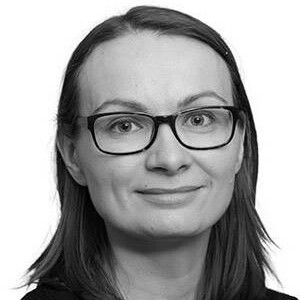
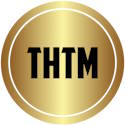
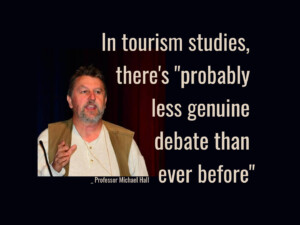
![Prof Soile Veijola on tourism studies, overtourism, the present, and the future 6 Professor Richard Butler on tourism’s challenges and academia’s inadequacies ... "[Don't] let wishful thinking take precedence over logic"](https://www.goodtourismblog.com/wp-content/uploads/2023/12/Prof-Richard-Butler-on-tourisms-challenges-and-academias-inadequacies-300x225.jpg)
